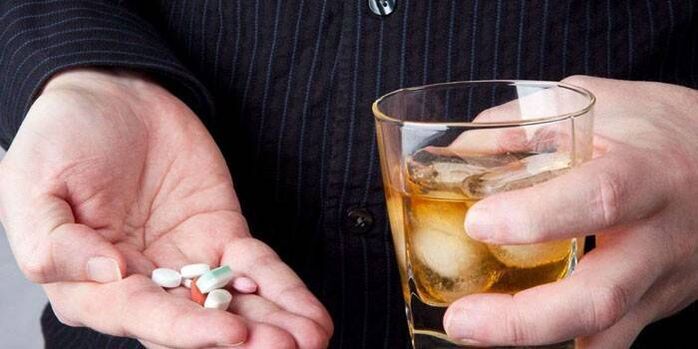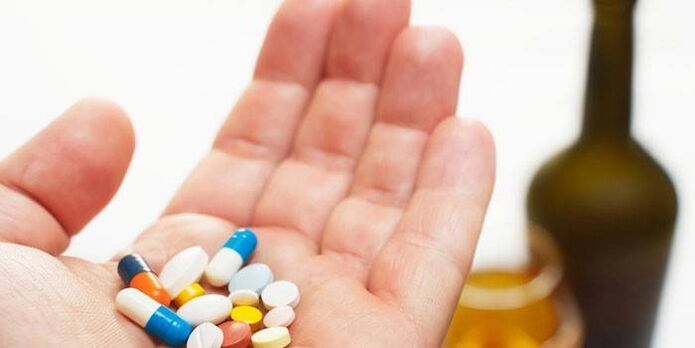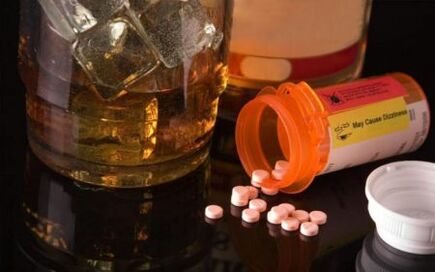Alcohol and antibiotics are the concepts of mutually exclusive and their simultaneous use will cause irreparable harm to health.Antibiotics are treated by many serious diseases even those that were considered incurable 100 years ago.They successfully destroy, kill various viruses, bacteria, and today remain the most effective medical drugs.Their use with alcohol can lead to resuscitation.Therefore, when the cycle of medication ended, the doctor needs to clarify when you can drink any alcohol after drinking antibiotics.

Antibiotics of our days
The effectiveness of antibacterial drugs is difficult to overestimate as it is impossible to calculate the number of rescued lives, thanks to these bitter drugs.Modern pharmacological power produces a huge number of these essential drugs.
Medicine has reached such heights that their intake has become safe for young children, and some types of antibiotics are prescribed even for infants.The course of taking antibiotics ranges from several days to 1-2 months.Doctors extremely strongly recommend not interrupting it and treat it from the first to the last day, observe precautions, and even more so to apply a taboo on all types of alcohol.
The peculiarity of antibiotic treatment is that they should be taken by time and a certain number of days.Some drugs cannot be mixed, drink strictly in the morning, day or evening - before meals or after eating - in general, observe the dosage and frequency.If these issues cause difficulties, it is better to consult a therapist and not be treated with them unsystematic.
The topic is also closed regarding the validity of antibiotics.The unsystematic use of antibacterial, antivirus drugs that imply antibiotics bears high risks.And do not forget that the drugs themselves have side effects.They are absolutely incompatible with alcohol.Therefore, during the period of the therapeutic course prescribed by a doctor, it is unacceptable to combine the use of drugs and at the same time pass a glass or two.
The fun can end sadly
If someone still thinks that you can take antibiotics and at the same time drink alcohol-to convince such a person in reverse opinion is quite simple.It is necessary to advise him, to read the annotation for any antibiotic, where it is written in black and white about high risks of combining alcohol and drugs.And these are not empty words.The most harmless will be the factor of useless treatment, taking drugs.And well, if it turns out so, and not otherwise.
There are enough examples when, after “snacking” with alcohol antibiotics, the continuation of the banquet is sad.In many cases, only resuscitators were able to lower the “degree of fun” and save the life of a negligent patient.The dangers of combining these two mutually exclusive substances are plenty of.
Antibiotics, in its structure, are complex natural or chemical (synthetic and semi -synthetic) substances.If their intake is prescribed by the therapist, then some complex infection is rampant in the body, and alcohol, its use, can ruin the clinical picture.
Diffusion, based on antibiotics and alcohol, will cause additional harm to health:
- During the disease, the body is weakened, immunity is suppressed, and drinking alcohol will not serve in any way.
- Antibiotics, on their own, do not in the best way affect the kidneys and heart, disrupt the balance of intestinal microflora.
- The use of alcohol together with drugs will cause irreparable harm to health.The kidneys and liver may not cope with increased load, which threatens liver or renal failure.
- If the intake of antibiotics is spelled out, alcohol will have to be excluded for a certain number of days.Otherwise, all treatment will go around the drain.Viruses, thanks to the combination of drugs and alcohol, will not be destroyed, but rather strengthen, gain resistant properties.
- We will have to change the antibiotic to a new generation drug, which carries additional risks.
- If you consume alcohol during treatment, bacteria can become immune to the course of therapy and then on the horizon it will loosen a very sad finale - clinical death from sepsis.
So, before drinking antibiotics with a glass of wine, it is better to think a thousand times.
Direct threat to health

In addition to the above dangers, taking such drugs together with alcoholic beverages (even high -quality) threatens:
- dizziness;
- cloudings of reason;
- nausea and vomiting;
- allergic reactions;
- long migraines.
Taking alcohol, together with drugs, leads to a violation of the functioning of almost all body systems.The immune system under the influence of alcohol will be additionally suppressed.Another unpleasant moment lies in a significant increase in alcohol.A person hangs out much faster, and a hangover syndrome will last longer than usual, with additional unpleasant consequences.And yet.Antibiotics are included in the category of a drug group, so lovers of combining alcohol and drugs will have a persistent addiction to antibacterial agents.That is, in the future, treatment may be ineffective.
Also, when alcohol and antibiotics entered the body, they break down into simple compounds.Some of the molecules of drugs coincide with alcohol molecules, and this fact poses an exceptional threat to health.The body systems perceive split alcohol as a drug and begin to react.
The doctor knows everything
Of course, after the course of treatment, one way or another, you will have to enter the usual rhythm of life, however, it is extremely recommended to affect the scrupulous question with the attending physician.That is, is it possible to drink alcohol after antibiotics and when?How many days should you pass after using the last tablet or capsule?Through what period of hours is it allowed to drink a certain amount of wine or beer?When and how much can you use large doses of alcohol?All these issues should be heard from the patient at the reception of the therapist after the final cure.
Taking off the ban on his own, a person is largely risks with his health (instead of one sore, you can make several), and in some cases - life.
Doctors, answering the question when you can drink alcohol after antibiotics, that is, after how long, they focus on the drug, the terms for excretion from the body, dosage and treatment time.Well, of course, on the harm that brings alcohol if you drink it with horse doses.The doctor determines the time frame individually for each patient.Any doctor perfectly understands that all people cannot be brought under one comb.
Each individual has its own body and prescribed treatment methods.Power produces a huge list of these drugs, and each of them has its own pharmacological properties.Some are quickly excreted from the body, others are linger in the liver, tissues, blood, etc.Therefore, an experienced doctor will never immediately say how long and when to drink.He will analyze all risks and only after a thorough analysis will issue his verdict.
Better to wait
A number of specialists in the field of medicine argue that the minimum abstinence from alcohol after completing antibiotics will be 10 days.This number of days is better to wait out.It is impossible, before the above period, seduce yourself with a glass of alcohol.Even if 7 days are indicated in the annotation, it is not the fact that antibiotics completely left the body.We remind you - each person and his health - individually.Therefore, the time of abstinence is obliged to determine the doctor.Failure to comply with the recommendations threatens the serious consequences, which were written above.

Ignore the instructions of the doctor, that is, to independently close the question of how much time alcohol will be allowed and start taking alcohol immediately after treatment - to make the following problems:
- manifestation of allergic reactions, sometimes in severe forms;
- There will be strong poisoning;
- The previous course of treatment will turn out to be ineffective (the appointment of other antibiotics will give hibrants to microbes in order to multiply again, and how much the repeated course will last is unknown);
- The remaining percentage of antibiotics in the body, together with alcohol, will greatly hit the vital organs and then additional treatment, in the recent past, will require healthy organs.
It is quite simple to avoid these and other consequences.You only need to wait for a term of 10 days, and even better, take a detailed consultation from the attending physician.























